The Impacts of rising World’s Oil Price on Japan’s GDP, fiscal balance, inflation and trade balance
VerifiedAdded on 2023/06/07
|7
|809
|64
AI Summary
This article discusses the impacts of rising oil prices on Japan's economy, including its GDP, fiscal balance, inflation, and trade balance. It explains how Japan's heavy reliance on oil imports makes it vulnerable to price increases, and how this can lead to inflation and reduced GDP. The article also explores the effects of rising oil prices on Japan's fiscal and trade balances, and includes graphs illustrating these trends.
Contribute Materials
Your contribution can guide someone’s learning journey. Share your
documents today.
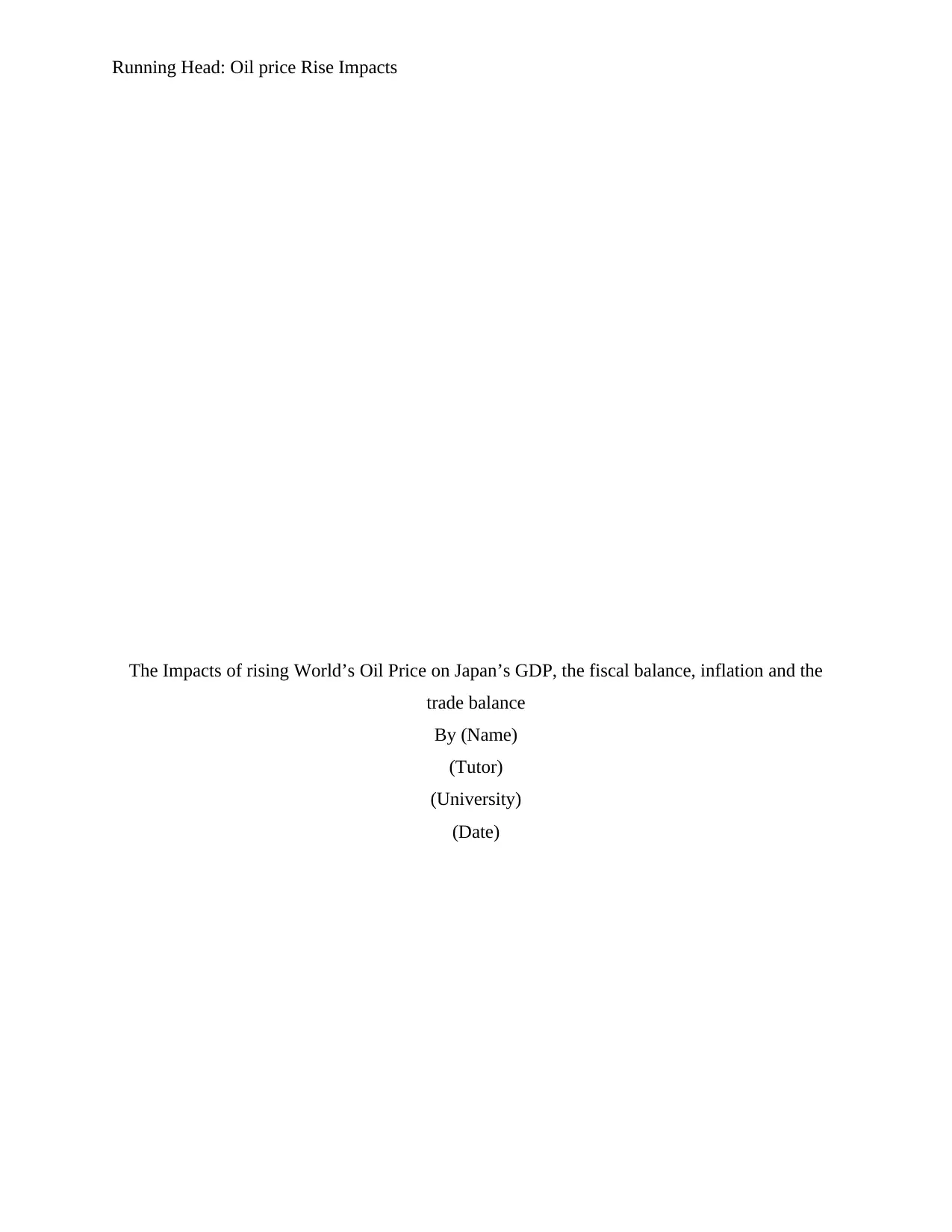
Running Head: Oil price Rise Impacts
The Impacts of rising World’s Oil Price on Japan’s GDP, the fiscal balance, inflation and the
trade balance
By (Name)
(Tutor)
(University)
(Date)
The Impacts of rising World’s Oil Price on Japan’s GDP, the fiscal balance, inflation and the
trade balance
By (Name)
(Tutor)
(University)
(Date)
Secure Best Marks with AI Grader
Need help grading? Try our AI Grader for instant feedback on your assignments.
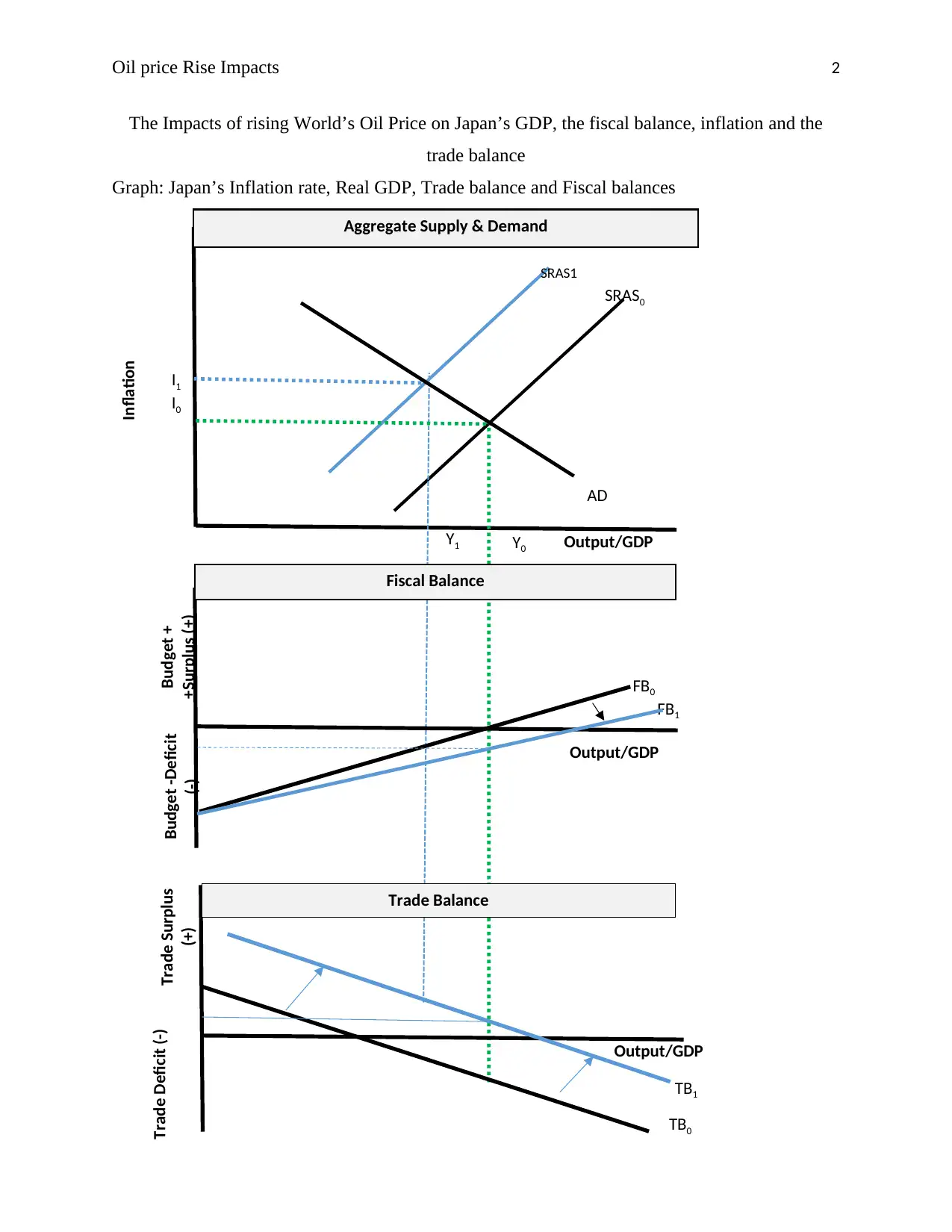
Oil price Rise Impacts 2
The Impacts of rising World’s Oil Price on Japan’s GDP, the fiscal balance, inflation and the
trade balance
Graph: Japan’s Inflation rate, Real GDP, Trade balance and Fiscal balances
Inflation
SRAS1
SRAS0
I1
I0
AD
Aggregate Supply & Demand
Output/GDPY0
Y1
Budget +
+Surplus (+)
FB0
FB1
Output/GDP
Budget -Deficit
(-)
Fiscal Balance
Trade Balance
Trade Surplus
(+)
TB1
TB0
Trade Deficit (-)
Output/GDP
The Impacts of rising World’s Oil Price on Japan’s GDP, the fiscal balance, inflation and the
trade balance
Graph: Japan’s Inflation rate, Real GDP, Trade balance and Fiscal balances
Inflation
SRAS1
SRAS0
I1
I0
AD
Aggregate Supply & Demand
Output/GDPY0
Y1
Budget +
+Surplus (+)
FB0
FB1
Output/GDP
Budget -Deficit
(-)
Fiscal Balance
Trade Balance
Trade Surplus
(+)
TB1
TB0
Trade Deficit (-)
Output/GDP
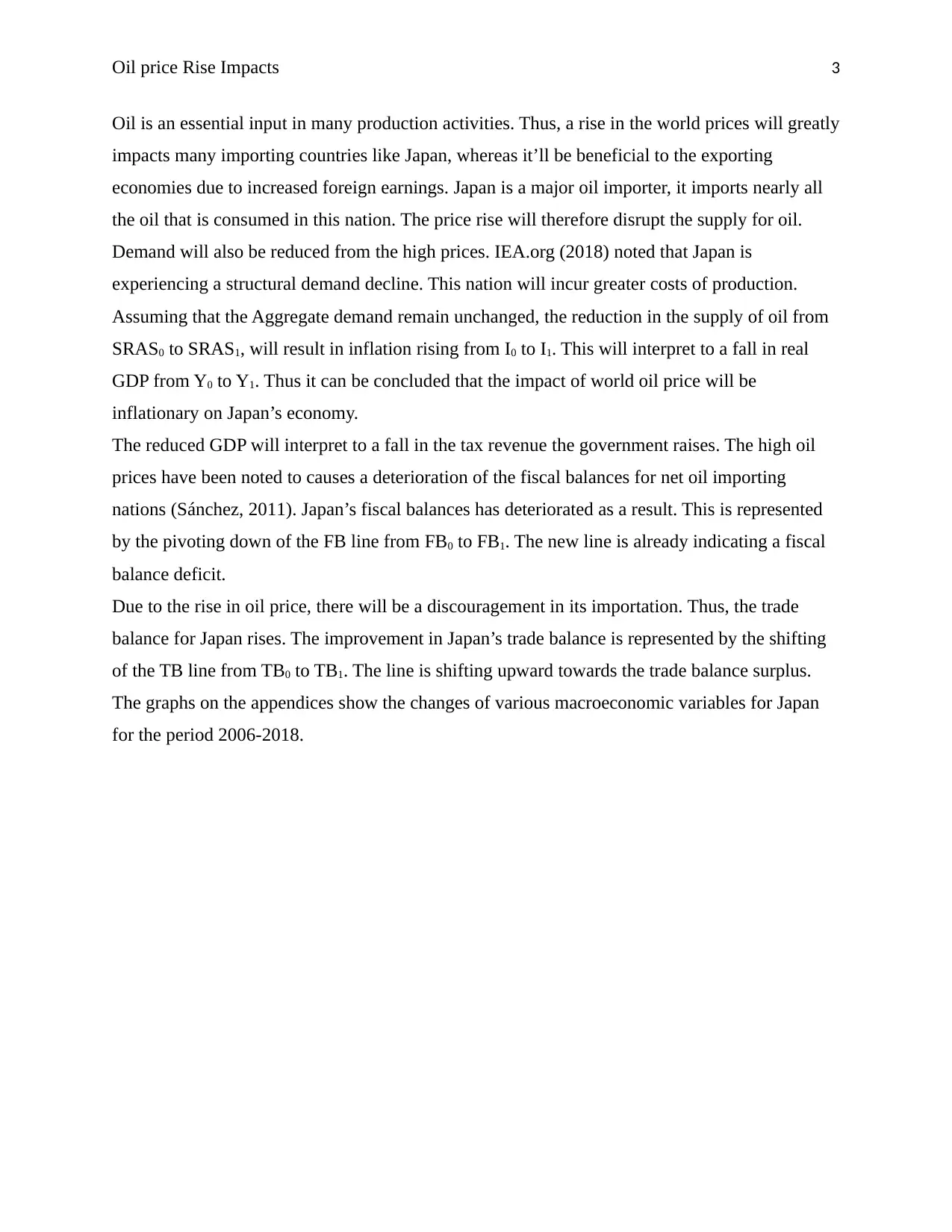
Oil price Rise Impacts 3
Oil is an essential input in many production activities. Thus, a rise in the world prices will greatly
impacts many importing countries like Japan, whereas it’ll be beneficial to the exporting
economies due to increased foreign earnings. Japan is a major oil importer, it imports nearly all
the oil that is consumed in this nation. The price rise will therefore disrupt the supply for oil.
Demand will also be reduced from the high prices. IEA.org (2018) noted that Japan is
experiencing a structural demand decline. This nation will incur greater costs of production.
Assuming that the Aggregate demand remain unchanged, the reduction in the supply of oil from
SRAS0 to SRAS1, will result in inflation rising from I0 to I1. This will interpret to a fall in real
GDP from Y0 to Y1. Thus it can be concluded that the impact of world oil price will be
inflationary on Japan’s economy.
The reduced GDP will interpret to a fall in the tax revenue the government raises. The high oil
prices have been noted to causes a deterioration of the fiscal balances for net oil importing
nations (Sánchez, 2011). Japan’s fiscal balances has deteriorated as a result. This is represented
by the pivoting down of the FB line from FB0 to FB1. The new line is already indicating a fiscal
balance deficit.
Due to the rise in oil price, there will be a discouragement in its importation. Thus, the trade
balance for Japan rises. The improvement in Japan’s trade balance is represented by the shifting
of the TB line from TB0 to TB1. The line is shifting upward towards the trade balance surplus.
The graphs on the appendices show the changes of various macroeconomic variables for Japan
for the period 2006-2018.
Oil is an essential input in many production activities. Thus, a rise in the world prices will greatly
impacts many importing countries like Japan, whereas it’ll be beneficial to the exporting
economies due to increased foreign earnings. Japan is a major oil importer, it imports nearly all
the oil that is consumed in this nation. The price rise will therefore disrupt the supply for oil.
Demand will also be reduced from the high prices. IEA.org (2018) noted that Japan is
experiencing a structural demand decline. This nation will incur greater costs of production.
Assuming that the Aggregate demand remain unchanged, the reduction in the supply of oil from
SRAS0 to SRAS1, will result in inflation rising from I0 to I1. This will interpret to a fall in real
GDP from Y0 to Y1. Thus it can be concluded that the impact of world oil price will be
inflationary on Japan’s economy.
The reduced GDP will interpret to a fall in the tax revenue the government raises. The high oil
prices have been noted to causes a deterioration of the fiscal balances for net oil importing
nations (Sánchez, 2011). Japan’s fiscal balances has deteriorated as a result. This is represented
by the pivoting down of the FB line from FB0 to FB1. The new line is already indicating a fiscal
balance deficit.
Due to the rise in oil price, there will be a discouragement in its importation. Thus, the trade
balance for Japan rises. The improvement in Japan’s trade balance is represented by the shifting
of the TB line from TB0 to TB1. The line is shifting upward towards the trade balance surplus.
The graphs on the appendices show the changes of various macroeconomic variables for Japan
for the period 2006-2018.
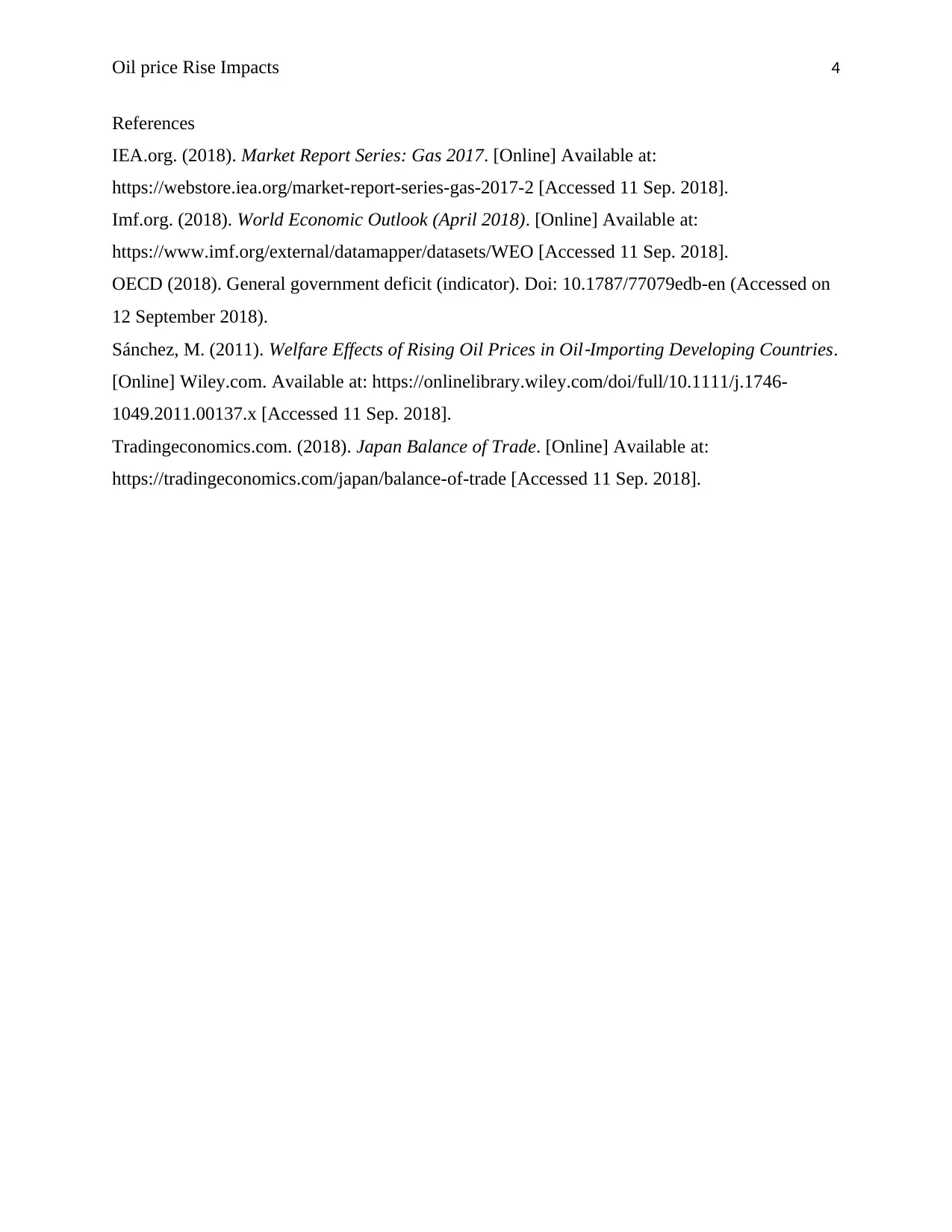
Oil price Rise Impacts 4
References
IEA.org. (2018). Market Report Series: Gas 2017. [Online] Available at:
https://webstore.iea.org/market-report-series-gas-2017-2 [Accessed 11 Sep. 2018].
Imf.org. (2018). World Economic Outlook (April 2018). [Online] Available at:
https://www.imf.org/external/datamapper/datasets/WEO [Accessed 11 Sep. 2018].
OECD (2018). General government deficit (indicator). Doi: 10.1787/77079edb-en (Accessed on
12 September 2018).
Sánchez, M. (2011). Welfare Effects of Rising Oil Prices in Oil
‐Importing Developing Countries.
[Online] Wiley.com. Available at: https://onlinelibrary.wiley.com/doi/full/10.1111/j.1746-
1049.2011.00137.x [Accessed 11 Sep. 2018].
Tradingeconomics.com. (2018). Japan Balance of Trade. [Online] Available at:
https://tradingeconomics.com/japan/balance-of-trade [Accessed 11 Sep. 2018].
References
IEA.org. (2018). Market Report Series: Gas 2017. [Online] Available at:
https://webstore.iea.org/market-report-series-gas-2017-2 [Accessed 11 Sep. 2018].
Imf.org. (2018). World Economic Outlook (April 2018). [Online] Available at:
https://www.imf.org/external/datamapper/datasets/WEO [Accessed 11 Sep. 2018].
OECD (2018). General government deficit (indicator). Doi: 10.1787/77079edb-en (Accessed on
12 September 2018).
Sánchez, M. (2011). Welfare Effects of Rising Oil Prices in Oil
‐Importing Developing Countries.
[Online] Wiley.com. Available at: https://onlinelibrary.wiley.com/doi/full/10.1111/j.1746-
1049.2011.00137.x [Accessed 11 Sep. 2018].
Tradingeconomics.com. (2018). Japan Balance of Trade. [Online] Available at:
https://tradingeconomics.com/japan/balance-of-trade [Accessed 11 Sep. 2018].
Secure Best Marks with AI Grader
Need help grading? Try our AI Grader for instant feedback on your assignments.
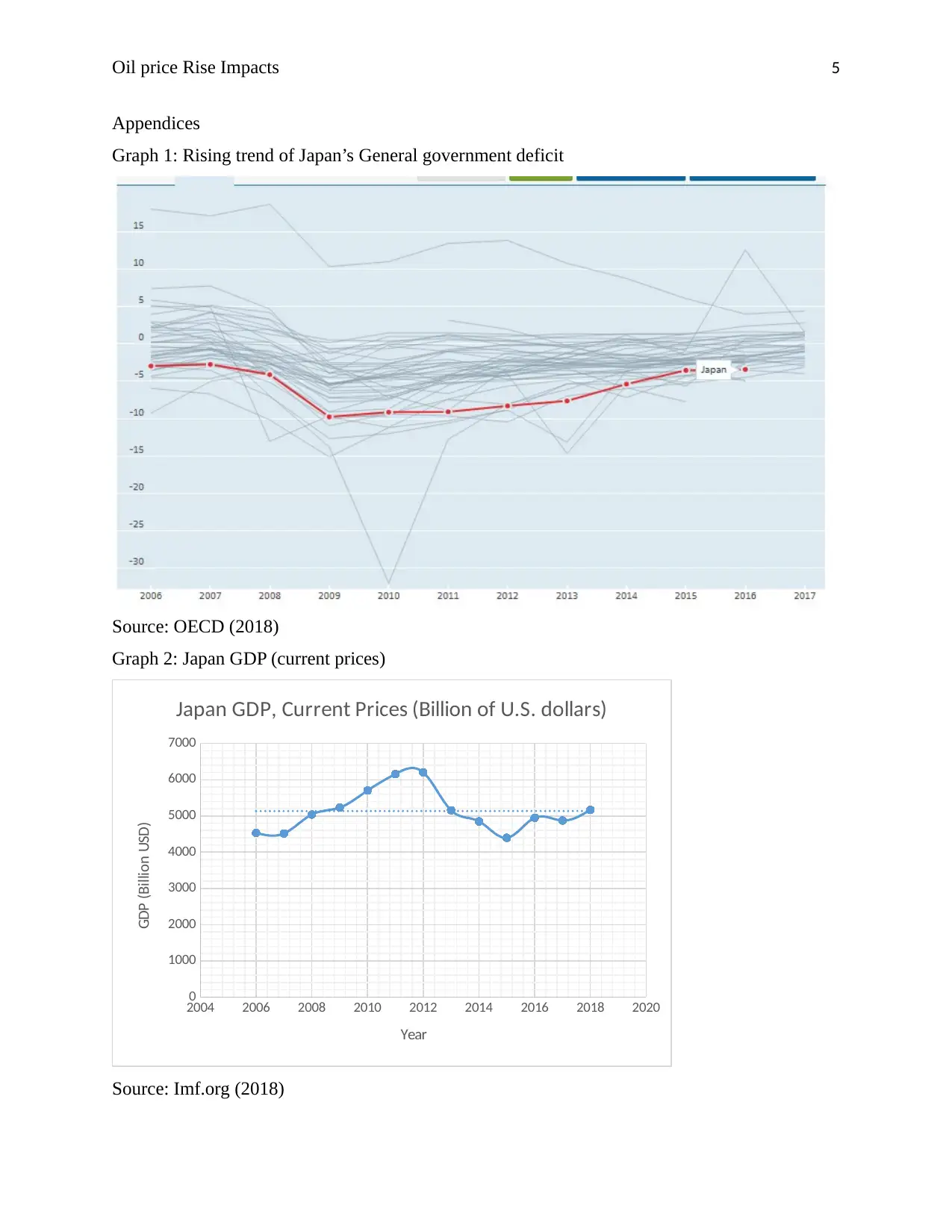
Oil price Rise Impacts 5
Appendices
Graph 1: Rising trend of Japan’s General government deficit
Source: OECD (2018)
Graph 2: Japan GDP (current prices)
2004 2006 2008 2010 2012 2014 2016 2018 2020
0
1000
2000
3000
4000
5000
6000
7000
Japan GDP, Current Prices (Billion of U.S. dollars)
Year
GDP (Billion USD)
Source: Imf.org (2018)
Appendices
Graph 1: Rising trend of Japan’s General government deficit
Source: OECD (2018)
Graph 2: Japan GDP (current prices)
2004 2006 2008 2010 2012 2014 2016 2018 2020
0
1000
2000
3000
4000
5000
6000
7000
Japan GDP, Current Prices (Billion of U.S. dollars)
Year
GDP (Billion USD)
Source: Imf.org (2018)
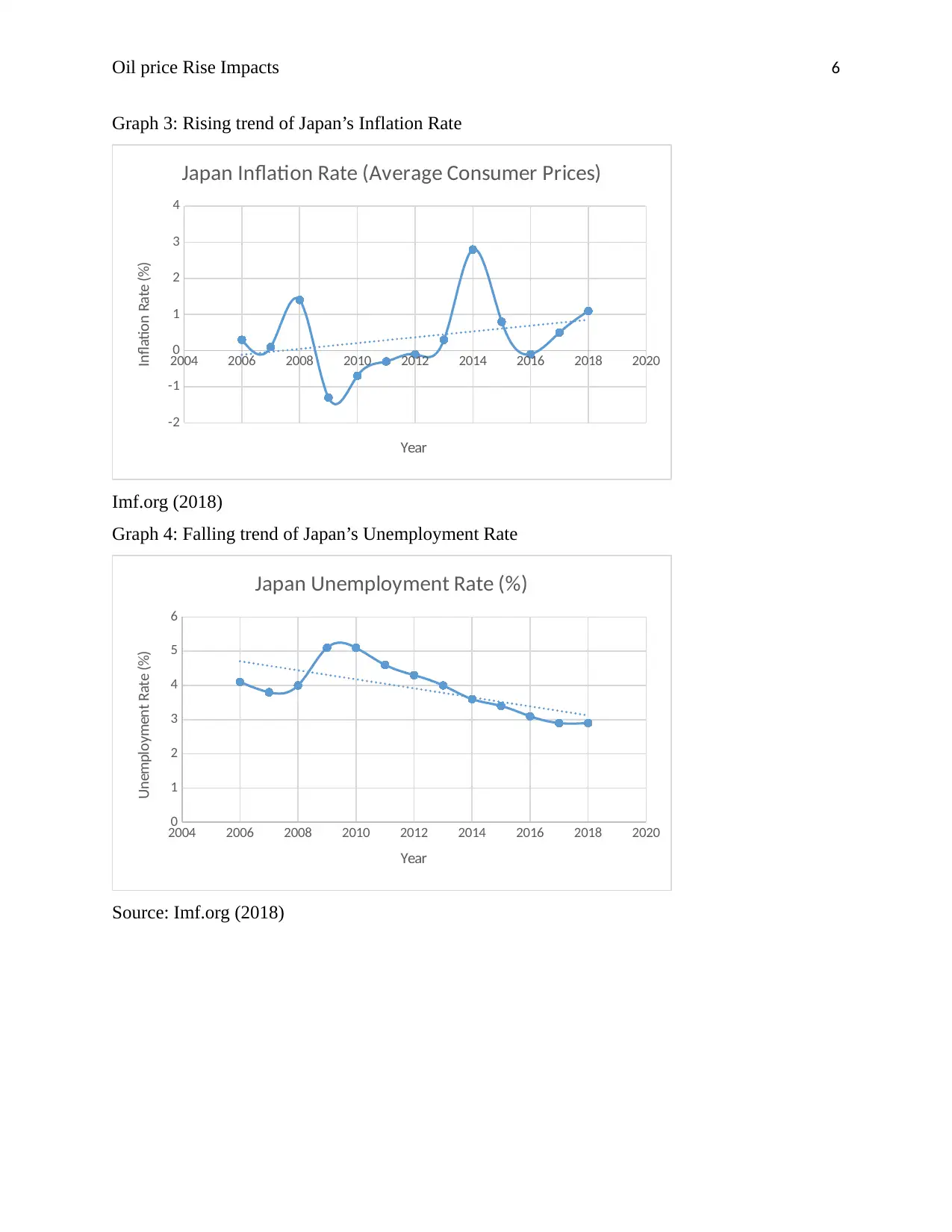
Oil price Rise Impacts 6
Graph 3: Rising trend of Japan’s Inflation Rate
2004 2006 2008 2010 2012 2014 2016 2018 2020
-2
-1
0
1
2
3
4
Japan Inflation Rate (Average Consumer Prices)
Year
Inflation Rate (%)
Imf.org (2018)
Graph 4: Falling trend of Japan’s Unemployment Rate
2004 2006 2008 2010 2012 2014 2016 2018 2020
0
1
2
3
4
5
6
Japan Unemployment Rate (%)
Year
Unemployment Rate (%)
Source: Imf.org (2018)
Graph 3: Rising trend of Japan’s Inflation Rate
2004 2006 2008 2010 2012 2014 2016 2018 2020
-2
-1
0
1
2
3
4
Japan Inflation Rate (Average Consumer Prices)
Year
Inflation Rate (%)
Imf.org (2018)
Graph 4: Falling trend of Japan’s Unemployment Rate
2004 2006 2008 2010 2012 2014 2016 2018 2020
0
1
2
3
4
5
6
Japan Unemployment Rate (%)
Year
Unemployment Rate (%)
Source: Imf.org (2018)
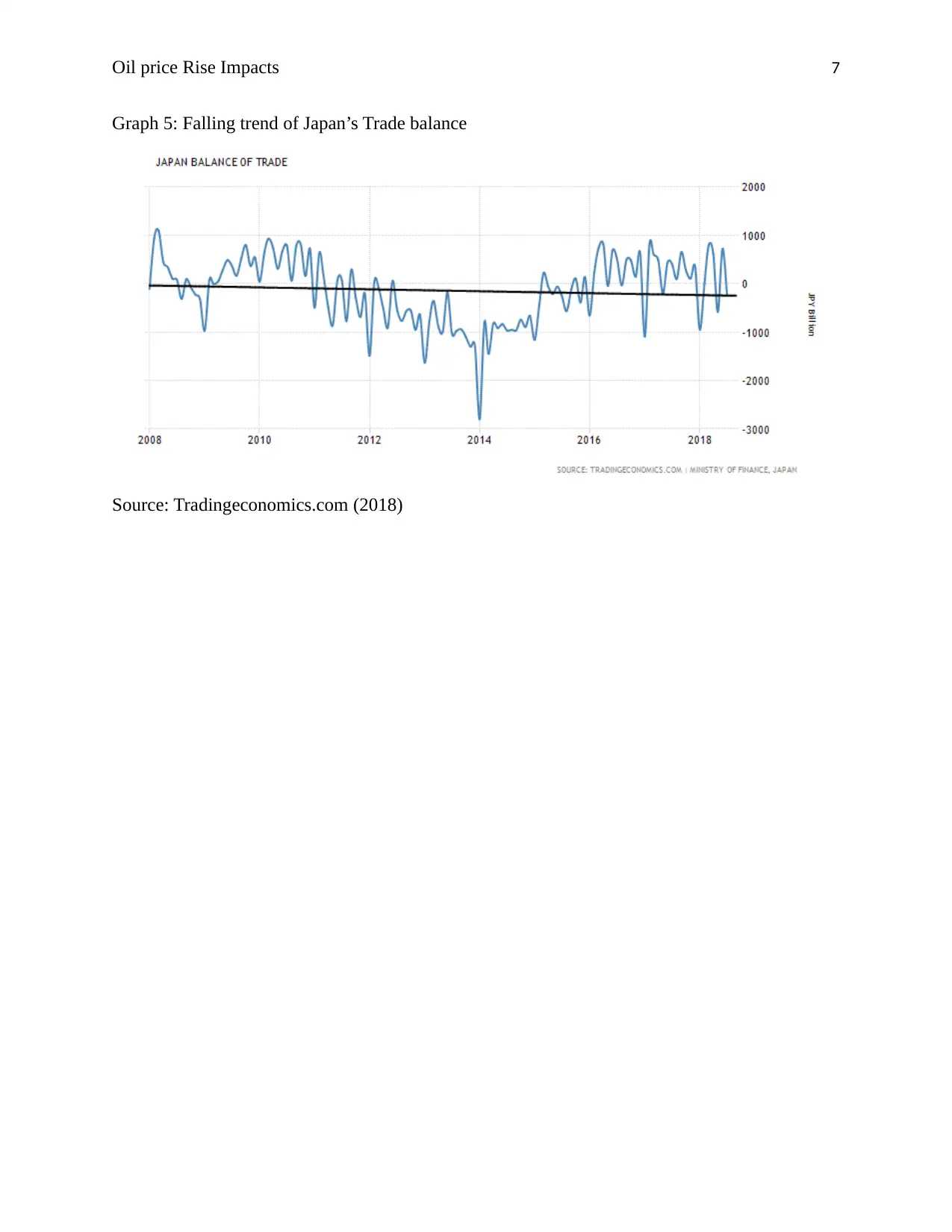
Oil price Rise Impacts 7
Graph 5: Falling trend of Japan’s Trade balance
Source: Tradingeconomics.com (2018)
Graph 5: Falling trend of Japan’s Trade balance
Source: Tradingeconomics.com (2018)
1 out of 7
Your All-in-One AI-Powered Toolkit for Academic Success.
+13062052269
info@desklib.com
Available 24*7 on WhatsApp / Email
![[object Object]](/_next/static/media/star-bottom.7253800d.svg)
Unlock your academic potential
© 2024 | Zucol Services PVT LTD | All rights reserved.